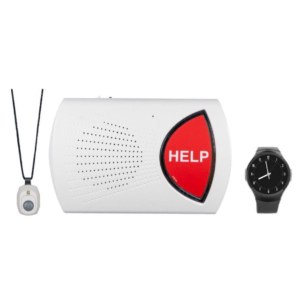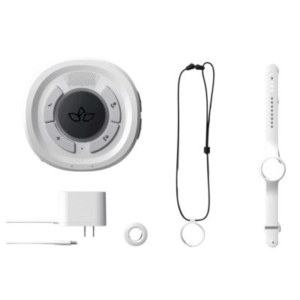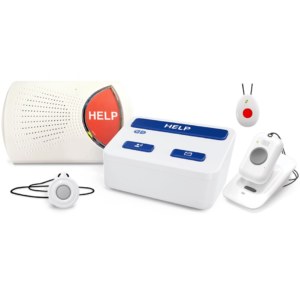Best Medical Alert Systems For People With Epilepsy
AgingInPlace.org keeps our resources free by working as an affiliate partner with some companies mentioned on our site. These partnerships or the commission we may earn do not affect our opinions or evaluations of the products we mention. Our reviews are solely based on our research methodology and from input from our AgingInPlace.org Advisory Board. Learn more about our ad policies.
Best Medical Alert Systems For People With E...
Products carousel
Having epilepsy puts you at a higher risk of injury. The good news is that a medical alert system with fall detection can help keep you safe. While these systems don’t detect and warn you of seizures, they can make it much easier for someone to come to your aid when you need help.
We’ve compiled this list of the best medical alert systems for people with epilepsy in order to help you find a device that works best for your needs. Now, you can spend less time browsing options and more time settled with the right device, feeling safe and secure.
Key Takeaways
- Fall detection is an important medical alert system feature for people with epilepsy.
- Other devices exist that can detect seizures immediately when they occur and alert caregivers.
- No device currently exists to prevent seizures from occurring in the first place.
Overview
Epilepsy is a condition affecting nearly 50 million people worldwide. It’s characterized by repeated seizures. A seizure is an episode involving involuntary movement that may cause loss of consciousness.
During a seizure, you may experience:
- Loss of awareness
- Loss of consciousness
- Impaired senses (hearing, vision, etc.)
- Temporary cognitive impairment
If you have been diagnosed with epilepsy, you’re also more likely to experience:
- Injuries
- Premature death
- Mental health conditions like anxiety or depression
Because epilepsy can cause sudden involuntary movements, you may be at risk of falling and hurting yourself while having a seizure. Due to the fact that a seizure can strike at any time, a medical alert system can provide an extra layer of security for people at risk of falling due to seizures. Medical alert systems can put you in touch with emergency services who can send help if needed.
Some providers offer around-the-clock monitoring by representatives who can quickly send someone to help you should you need assistance. Some medical alert systems with fall detection can even alert caregivers when a person has fallen or activated an emergency call.
There are two main categories of medical alert systems: in-home and mobile.
- In-home systems typically include a base station and a wearable help button. When the button is pushed, two-way communication via the base station is activated, allowing the person to ask for help. If you can’t communicate with the call center employee or 911 operator, someone will be sent to check on you.
- Mobile devices are designed to be worn at all times and allow you to press a button to get immediate assistance. Many mobile systems also feature GPS tracking, so someone can locate you if you have a seizure outside of your home.
The best medical alert system for someone with epilepsy is one that features automatic fall detection. That way, if you have a seizure and fall, someone can come to your aid regardless of whether you are able to press the help button or not.
Epilepsy Medical Bracelet
An epilepsy medical bracelet is a medical ID product that lets other people know that you have epilepsy. One of the most well-known providers of medical ID bracelets is MedicAlert.
Some bracelet providers have 24/7 helpline services that allow first responders to get more information about you and your condition.
Medical Alert Systems for Seniors with Epilepsy Review:
- Top Rated: Bay Alarm Medical
- Best Caregiver Tools: Aloe Care Health
- Best Budget Option: Medical Alert
Our top pick for medical alert systems for people with epilepsy is Bay Alarm Medical.
Purchasing one of the company’s systems requires no commitment, and every system comes with a 30-day risk-free trial. The brand also guarantees that once you’re locked into a plan, prices will never increase.
In-home system pricing starts at $24.95 per month.
All in-home systems, including landline and LTE cellular plans, come with 24/7 monitoring. For an extra cost, you can choose a premium LTE cellular package that includes multiple wall help buttons.
The on-the-go systems starts at $29.95 per month, plus the cost of the device itself.
This system consists of a GPS mobile help button. Three options are available: Mobile LTE, Mobile PLUS, and Mobile 360.
Like the in-home systems, the mobile systems all come with 24/7 monitoring. In addition, they offer caregivers the ability to track their loved ones. The more expensive PLUS and 360 plans feature mobile fall detection. The 360 plan offers GPS mobile tracking plus an in-home system for those who want the maximum level of security.
The brand also offers an SOS smartwatch for $29.95 per month. It’s a good choice for people with more active lifestyles. Also, since it’s secured to your wrist, you don’t have to worry about losing the device should you experience a seizure. It includes 24/7 monitoring and location tracking but does not feature fall detection.
Keep in mind that fall detection activates when it detects sudden downward movement followed by no movement at all. It’s not always guaranteed to detect every fall. Most companies, Bay Alarm Medical included, recommend still pressing the button, if possible, to ensure guaranteed assistance.
If you want the benefit of a medical alert system that works inside and outside the home, Bay Alarm Medical also offers a bundle package starting at $39.95 per month.
See Our Full Bay Alarm Medical Review.
Aloe Care Health is our recommendation for caregivers who want to keep an eye on loved ones with epilepsy.
The company’s medical alert system features a voice-activated Smart Hub, a Care Button, and a helpful smartphone app. You can get in touch with emergency services with the touch of a button or by pressing the Care Button. The Care Button comes in the form of a convenient bracelet. An added bonus is that the sleek design is discreet and doesn’t scream, “I’m a medical alert system!”
The most expensive in-home system includes an automatic fall detection device, which isn’t likely to be useful for those with epilepsy who need fall detection wherever they go.
For people who want access to help on the go, the brand also offers a Mobile Companion, which features automatic fall detection. The device costs $99.99, plus a $24.99monthly monitoring fee. There’s also a 30-day money-back guarantee. Unlike other systems, fall detection on this device doesn’t cost extra. The mobile unit also gives you the ability to communicate directly with response center personnel.
The smartphone app gives caregivers access to real-time updates on their loved ones. It even provides the ability to call a loved one’s Smart Hub unit.
The system includes 24/7 monitoring by a Five Diamond Emergency Response Center. Keep in mind that all system plans come with a one-time hardware cost. This might be a dealbreaker if you’re on a tight budget.
There are fewer customer reviews available for Aloe Care Health, but the majority of them seem to be positive.
See Our Full Aloe Care Health Review.
If you’re on a tight budget but want added peace of mind as you go about your day, Medical Alert might be a great solution for you.
Plans start at only $19.95 per month, and customers get discounts if they opt for an annual plan. Systems come with 24/7 response and notifications to loved ones if you need assistance in non-emergency situations.
You can choose either an in-home system that includes a wearable button or bracelet, or a mobile system. The mobile system comes with a button that can be worn as a bracelet or pendant. It also offers GPS location services.
See Our Full Medical Alert Review.
Other Options
Some watches and armbands are equipped to monitor health markers, like heart rate, and send out alerts to emergency contacts or let you know when you’re about to have a seizure. These include:
- Embrace2 from Empatica
- NightWatch
- SAMi
- Epi-Assist Emfit Epileptic Sensor Mat
- Apple Watch Series 6
It is important to note that seizure detection devices are not suitable for all types of seizures. For this reason, a medical alert system with fall detection may be a better choice for people who have seizures with little to no movement. Most seizure detection devices only activate alerts to caregivers when they detect bigger movements.
How to Choose the Best Medical Alert System if Your Loved One Has Epilepsy
The following features may be helpful if you or your loved one has epilepsy:
- Automatic fall detection. This activates a help call without the need to press a button. It’s important to note that fall detection isn’t guaranteed.
- Caregiver monitoring. If you’re worried about a loved one with epilepsy, look for a brand that offers caregiver tools like remote monitoring. Some systems, like some Aloe Health Care Smart Hub plans, allow caregivers to call in through the hub to check on their loved ones.
- On-the-go detection. If you have an active lifestyle, you should opt for mobile medical alert systems that can be activated outside of the home. Many of these devices also come with GPS locator technology.
Frequently Asked Questions
-
It’s a good idea to wear a medical alert bracelet if you have epilepsy. This lets first responders know all the pertinent details about your condition in the event you’re not able to communicate.
-
Yes. These are designed to detect seizures and alert family members that you’re having a seizure. They don’t work to detect all types of seizures, but they may be useful for detecting tonic-clonic seizures that produce a lot of movement.
-
No. It’s possible that your Medicare Advantage plan offers coverage, but this is unlikely.
-
No. However, some downloadable apps may be able to detect seizures using smartwatch data.
-
No. Fitbit devices aren’t designed to detect seizures.
*Pricing is accurate as of March 29, 2022.
Other Medical Alert Guides And Medical Alert Systems That We Have Reviewed
- Best Medical Alert Systems
- Best Medical Alert Systems with Fall Detection
- Best Personal Emergency Response Systems (PERS)
- Best Medical Alert Systems With No Monthly Fee
- Best Medical Alert Watches for 2022
- Best Medical Alert Bracelets for Seniors
- Best Medical Alert Systems with GPS
- Medical Guardian Review
- Aloe Care Health Review
- MobileHelp Review
- Bay Alarm Medical Review
- Medical Alert Review
- GreatCall Review
- LifeStation Review
- LifeFone Review
- Philips Lifeline Review
- MobileHelp Smart Review
- Alert1 Review
- ADT Medical Alert Review
- Apple Watch Medical Alert Review
- GreatCall Lively Mobile Reviews
- Rescue Alert Medical Alert Review
- Life Alert Review
Learn More About Medical Alert Systems
- Does AARP Cover Medical Alert Systems?
- Is a Medical Alert System Tax-Deductible?
- Medical Alert Systems Covered by Medicare
- Who Should Wear a Medical Alert System?
- Pros and Cons of a Medical Alert System from Wal-Mart
- What Is The Cost of Medical Alert Systems
- Medical Alert Jewelry Options
WRITTEN BY
Steph Coelho is a freelance writer and editor. In addition to nearly a decade spent writing and editing the written word, Steph also has experience working with and creating recreation programs for older adults.
View AuthorDo you want to cite this page? Use our ready-made cite template.







